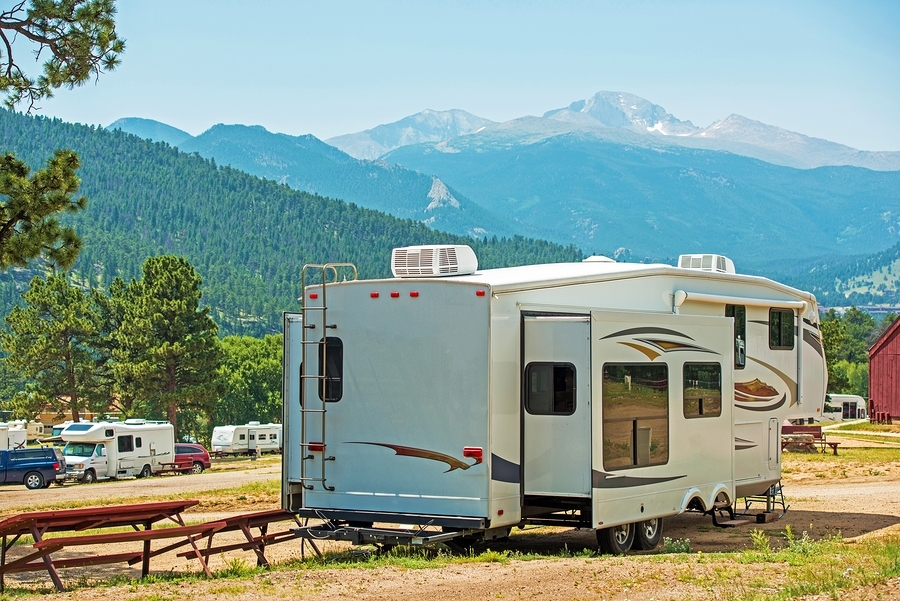Get Your Camper Mattress Ready to Roll

Your time on the road should be both relaxing and restful.
Remember last year's camping trips? All those scenes from the open road, good times roasting hot dogs with family and memories—oh, and of your aching back? You should enjoy your time out in your RV, and part of that is getting a good night's sleep, even on your traveling camper mattress.
Problems with mattresses for campers generally fall into one of several categories. Scan through our handy list to see if any of these sound familiar. And remember, even when you're on a budget, sometimes replacing the mattress is the most economical (and sanity-saving) solution, especially when you're far away from home.
The mattress is too firm.
Some camper mattresses can be improved just by adding a foam mattress topper or a plush mattress pad right on top. Many people automatically think "memory foam!" but be aware that in a RVs, which generally don't have great temperature control, the cold nights can mean a rock-hard topper. And because memory foam "sleeps warm," it can make a hot night in the camper feel even stickier. Consider a half-cap pillowtop mattress topper or a removable layer made of a high-density foam, many of which are available in a variety of firmnesses.
The camper mattress is too soft.
This one's tough – without going in and changing out what the camper mattress is actually made of, there's only so much you can do to add support to a swaybacked mattress. You could try adding a firm foam layer on top of your RV mattress, but that doesn't change anything about the marshmallow support. We'd recommend a replacement camper mattress.
The mattress is too thin.
Many camper mattresses rest on a flat, hard platform. If you can feel this platform through your camper mattress, especially when you turn from side to side, the mattress is either too thin to begin with, or its internal support has worn out. You could try adding a layer of firm, supportive foam between the mattress and its support platform—but we really recommend replacing a tired mattress with something that has better bones.
The mattress doesn't fit right.
Camper mattress sizes can be tricky—they come in a variety of shapes and sizes. After all, RVs are all about maximizing space, and you don't want your mattress interfering with doors, windows, drawers or life in general. For example, angled vertical walls may need a thinner mattress, or corners may need to be rounded or cut off to make a mattress work. When it comes to measuring sometimes-awkward camper spaces for a mattress that fits, a specialist can help you measure the bed platform's maximum width and length, and evaluate the overall space the mattress needs to fit into.
Tips on Budgeting for a Replacement Camper Mattress
We're sensitive to the fact that a camper mattress isn't often the highest priority in the family budget. Most RV mattresses are also oddly shaped or sized, so they can come at an additional cost. So when should you skimp? When should you splurge?
Skimp: If you're only an occasional camper, or you have an RV but you don't think you'll be keeping it for the long haul, chances are you'll be satisfied with a modification of an existing uncomfortable mattress. Try some of the foam padding tips we mentioned above, and be sure to check out any special offers we have going on from time to time.
Splurge: If you're spending a lot of time in your camper, or you know you'll be using it regularly over many years, you may end up with bigger medical bills for a bad back by trying to save a few dollars on a good camper mattress! Consider how many nights you'll be sleeping in your RV, and balance the cost of the mattress against the price of your comfort. Even minimal upgrades to your current camper mattress can pay off for years.



![[Down]](https://42cdev.com/client/mattressmill.com/images/arrow-down.svg)
![[Search]](https://42cdev.com/client/mattressmill.com/images/musica-searcher.svg)
![[Close]](https://42cdev.com/client/mattressmill.com/images/close.svg)



![[Filter]](https://42cdev.com/client/mattressmill.com/images/big-filter.svg)
![[Menu]](https://42cdev.com/client/mattressmill.com/images/menu-lines.svg)